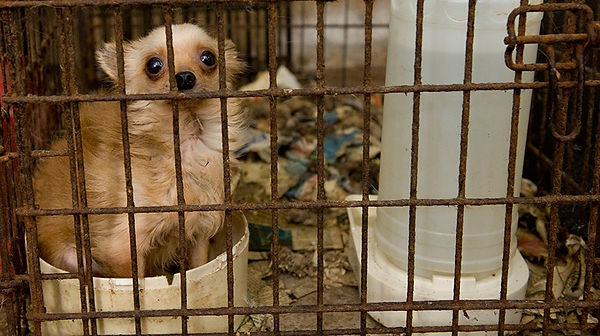
Did You Know....
There are an estimated 10,000 puppy mills in the U.S.
Puppy mills are the factory farms of the dog breeding industry. The dogs
are typically housed in unsanitary and overcrowded conditions, often kept
in wire cages that cause injuries and disease. They do not have access to
toys, bedding, exercise, socialization, affection, and do not have adequate
food, water and veterinary care. Many facilities are outdoors so the dogs
spend all their time year round exposed to the elements. If they are
indoors, they’re crowded into basic, filthy structures without climate control.
Like factory farms, the bottom line is profit and all decisions are based
around maximizing it. Female dogs are bred as often as they are able
without adequate recovery time between litters. When they can no longer
be impregnated, they are auctioned off or killed. The number of breeding
dogs can be anywhere from 10 to 1,000 depending on the size of the
operation; many are unlicensed so it’s difficult to know the true average.
Puppy mill operators don’t take the time to apply proper husbandry practices that would normally remove sick dogs from their breeding pools. Keeping sick or deformed dogs leads to puppies prone to a myriad of congenital and hereditary conditions such as kennel cough, giardia, parvovirus, pneumonia, respiratory disorders, kidney and heart disease, epilepsy, heartworm and many more. It also leads to unchecked genetic defects that can include personality disorders or physical problems that require special and costly treatment, or even cause premature death. The lineage records are often falsified so a lot of the time puppies are sold as whatever breeds are the current best sellers.
Puppy mills also tend to produce dogs with behavioral issues. Puppies are most often removed from their families at just 6 weeks old; their first few months are a critical socialization period for them. Being taken away from their mother and littermates can cause extreme shyness, fear, aggression and anxiety- basically a recipe for a dog who is going to be given up to a shelter because they are “unmanageable.”
There are between 2,000 and 3,000 USDA-licensed “breeders” in the U.S., but licensing is not always a requirement so the majority of operations are unlicensed or just flat out illegal. The ASPCA estimates that between the known and unknown mills, there are about 10,000 currently in operation. The largest concentration of puppy mills is in Missouri followed by Pennsylvania, Ohio, and upstate New York.
I don't want dogs to suffer! May pet stores will claim that their puppies come from “licensed USDA breeders” or “local breeders,” but those phrases provide a false sense of security. A dog may be registered, may “have papers,” but that means nothing more than the fact that the parents both had papers. Many pedigreed, registered dogs are bred in puppy mills. Additionally, puppies sold online are mostly from puppy mills. The only way to truly know where your puppy comes from is to see for yourself. Any reputable and caring breeder would want to meet and screen potential pet parents so they should be open to a meeting and a tour. However, over 650,000 dogs die each year in shelters. Save a life! Adopt, don't shop.


